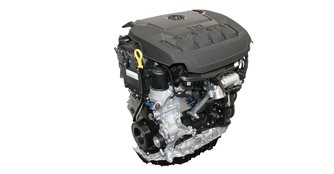2018 Volkswagen Tiguan debuts new 2.0-litre TSI EA888 four-cylinder engine
27 May 2017|6,399 views
The all new 2018 Volkswagen Tiguan arrives in U.S.A dealerships this summer powered by the most advanced version ever of Volkswagen's EA888 four-cylinder engine. The updated version of the benchmark EA888 four-cylinder, turbocharged and direct injection engine uses an innovative modification to the conventional four-stroke cycle to offer an improved combination of power, efficiency and responsiveness.

Though EPA estimates are not yet available - compared with the 1.8-litre EA888 Gen 3 engine that is fitted in the current Passat, Jetta, Beetle, and Golf family models in the U.S.A - the new 2.0-litre EA888 Generation 3B is expected to offer improved fuel efficiency, along with a 20 percent boost in maximum torque to 300Nm.
The majority of the engine - from the cast-iron block to the aluminium-alloy pistons and cylinder head to the valve springs - has been updated along the way. During development, engineers focused on making the engine more efficient in the range of driving that most customers use every day, which led to the introduction of a modified Miller combustion cycle that is unique to the Volkswagen Group.
Whereas the traditional Miller cycle closes the intake valves just before the end of the intake stroke, the so-called Budack cycle closes the intake valves much earlier. This results in longer effective combustion, as well as faster air flow for the incoming gases, which improves the mixing of the fuel and air.
The net effect is lower fuel consumption and more torque than the 2.0-litre EA888 engine fitted in the 2017 Tiguan. The new 2.0-litre TSI engine will be the only powerplant offered in the 2018 Tiguan. It will later be offered in other Volkswagen models.
The all new 2018 Volkswagen Tiguan arrives in U.S.A dealerships this summer powered by the most advanced version ever of Volkswagen's EA888 four-cylinder engine. The updated version of the benchmark EA888 four-cylinder, turbocharged and direct injection engine uses an innovative modification to the conventional four-stroke cycle to offer an improved combination of power, efficiency and responsiveness.
First introduced in the Volkswagen 2009 CC, the EA888 continued Volkswagen's move toward smaller, turbocharged engines that offer the fuel economy benefits of downsizing with the power of a larger displacement unit.
Though EPA estimates are not yet available - compared with the 1.8-litre EA888 Gen 3 engine that is fitted in the current Passat, Jetta, Beetle, and Golf family models in the U.S.A - the new 2.0-litre EA888 Generation 3B is expected to offer improved fuel efficiency, along with a 20 percent boost in maximum torque to 300Nm.
The majority of the engine - from the cast-iron block to the aluminium-alloy pistons and cylinder head to the valve springs - has been updated along the way. During development, engineers focused on making the engine more efficient in the range of driving that most customers use every day, which led to the introduction of a modified Miller combustion cycle that is unique to the Volkswagen Group.
Whereas the traditional Miller cycle closes the intake valves just before the end of the intake stroke, the so-called Budack cycle closes the intake valves much earlier. This results in longer effective combustion, as well as faster air flow for the incoming gases, which improves the mixing of the fuel and air.
The net effect is lower fuel consumption and more torque than the 2.0-litre EA888 engine fitted in the 2017 Tiguan. The new 2.0-litre TSI engine will be the only powerplant offered in the 2018 Tiguan. It will later be offered in other Volkswagen models.
Latest COE Prices
August 2025 | 1st BIDDING
NEXT TENDER: 20 Aug 2025
CAT A$102,009
CAT B$123,498
CAT C$70,001
CAT E$122,334
View Full Results Thank You For Your Subscription.


















